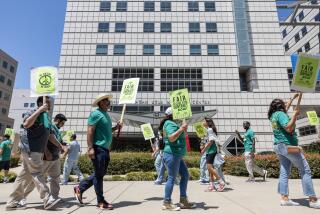UCI Misled Liver Unit Regulators on Staffing
As regulators threatened to close the troubled liver transplant program at UCI Medical Center last year, the hospitalâs chief executive provided false information to keep the unit running, according to a government document.
The program hung on for more than a year before it was forced to shut down last month.
Regulators had relied on a written assurance from Dr. Ralph Cygan, the hospitalâs chief executive, that UCI had recruited a full-time transplant surgeon to revive the program. Around the same time, hospital officials presented the same information during a meeting with regulators, including federal health officials.
In fact, the new surgeon, Dr. Marquis Hart, was based at UC San Diego, 90 miles away, and planned to help only part time at the UC Irvine hospital in Orange.
Cygan is currently on paid administrative leave while a panel of experts investigates the problems with the UCI liver transplant program.
Details of how UCI misled regulators were included in a letter sent Monday from the U.S. Health Resources and Services Administration to Sen. Charles Grassley (R-Iowa), chairman of the Senate Finance Committee, who is investigating inequities in the national transplant system.
Without a full-time surgeon, the problems at UCI persisted -- it still performed too few transplants and turned down the vast majority of livers offered for its patients. Some died on the waiting list.
In May, for example, UCI refused eight livers that were eventually used for transplants elsewhere. In three of those instances, the hospital reported that no surgeon was available, according to the United Network for Organ Sharing, which oversees transplantation for the government.
The troubles caught up with UCI last month, when the federal Medicare program announced it would stop paying for transplants. The program closed the same day.
UCI spokeswoman Susan Menning declined to comment Tuesday, saying she had not seen the letter or documents mentioned in it. Cygan, through a hospital spokeswoman, also declined to comment.
Grassley said in a statement that UCIâs false assurances, coupled with alleged fraud in the liver transplant program at St. Vincent Medical Center in Los Angeles, suggest that âitâs time to stop relying on information from troubled transplant centers.â
St. Vincent shut its liver transplant program this fall after a scandal in which staff members let a patient jump the line for an organ, and then tried to cover up the misallocation.
Grassley said his committee needed to know whether the government and the national transplant oversight group were âdoing what should be done to deter and catch the bad actors.â
The United Network began investigating UCI in 2002 because its post-transplant survival rate was too low. By the end of that year, âit was clear that the programâs performance would not improve on its own,â the letter to Grassley said.
Part of the problem was a lack of surgeons. There was just one, Dr. Sean Cao -- and he had become so concerned about the survival rate that he rarely accepted livers for his patients.
The number of transplants fell from 15 in 2001 to eight in each of the next two years, well below the federal standard of 12, which is aimed at maintaining proficiency.
Attempts to fix the program failed, and in early 2004, regulators moved to close it. As Cao prepared to leave, the hospital sent a team to meet with a United Network committee.
Government representatives at the meeting âleft with the clear impression that Dr. Hart would be leaving UC San Diego and moving full time to UCI,â the letter to Grassley said. The United Network requires that programs prove they can provide medical and surgical coverage to their patients at all times.
UCI administrators also told their transplant staff in 2004 that their plan for keeping the program open centered on Hart. âWe had inferior stats at UCI,â said Lorrie Gibson, a transplant coordinator at the time. âBut the proposal was that Dr. Hart was a stellar performer, and that with his 100% presence at UCI, he could bring the program up to snuff.â
On its website, UCI posted his profile: âDr. Hart is an experienced transplant surgeon who comes to us from the UC San Diego Medical Center,â giving no indication that he was still working full time there.
Hart âwas not planning to leave UCSD,â spokeswoman Leslie Franz said in an e-mail Tuesday. Through Franz, Hart declined to comment.
The UC San Diego hospital had agreed to allow him and another surgeon, Dr. Ajai Khanna, perform liver transplants at UCI when organs became available. UCI paid an on-call fee of $10,000 a month, half of the doctorsâ set fees and $200 an hour for administrative services provided by Hart.
Hart spent no more than 1 1/2 days a week at UCI seeing patients, Gibson said.
âSometimes heâd have an emergency at San Diego, and he couldnât even see the patients we had lined up,â she said.
Whenever a donated liver became available for a UCI patient, the local organ procurement agency would call a transplant coordinator, who would pass on the details to Hart to decide whether to accept it.
At most centers, the surgeon removing the liver from the donor also transplants it into the recipient. This allows the team to evaluate the organ firsthand. Transplant programs typically refuse organs that are too big or of poor quality.
Hart did not have time to remove organs for UCI patients, Gibson said. Instead, the hospital would arrange for another surgeon, often from another medical center, to take out the liver and relay information to Hart and Khanna.
The arrangement did not solve UCIâs woes. Before the program closed last month, it had performed only five transplants this year.







